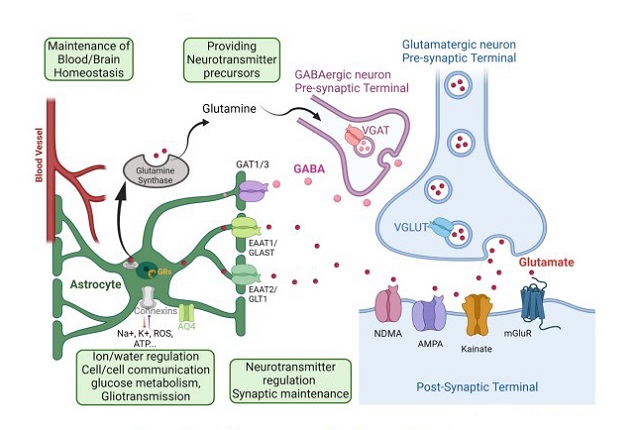Nikhil Prasad Fact checked by:Thailand Medical News Team Jun 09, 2024 10 months, 1 week, 6 days, 2 hours, 17 minutes ago
Medical News: Researchers have been delving into the complex relationship between brain cells, known as astrocytes, and mood disorders like depression and post-traumatic stress disorder (PTSD). This
Medical News report explores the study findings by researchers from Campbell Family Mental Health Research Institute-Canada and University of Toronto-Canada, making the science easy to understand for everyone.
 Key functions of astroglial cells. Astroglia play an important role in synaptic maintenance, reuptake of neurotransmitters from the post-synaptic space, recycling of GABA and glutamate, cell–cell communication, the formation of the perivascular space, etc.
What Are Astrocytes?
Key functions of astroglial cells. Astroglia play an important role in synaptic maintenance, reuptake of neurotransmitters from the post-synaptic space, recycling of GABA and glutamate, cell–cell communication, the formation of the perivascular space, etc.
What Are Astrocytes?
Astrocytes are star-shaped cells in the brain that were once thought to play a simple support role. However, recent research has revealed that they are crucial for maintaining the brain's health. They help in maintaining the balance of chemicals, support the structure of the brain, and assist in the recycling of neurotransmitters, which are chemicals that transmit signals in the brain.
The Role of Astrocytes in Stress and Mood Disorders
Stress is a significant factor in the development of mood disorders. When a person experiences chronic stress, their brain undergoes various changes, including the function of astrocytes. These changes can contribute to the symptoms of depression and PTSD. Researchers have found that in people with these conditions, astrocytes often do not function correctly.
How Stress Affects Astrocytes
The body's response to stress is regulated by the hypothalamic-pituitary-adrenal (HPA) axis, which releases stress hormones like cortisol. Astrocytes are particularly sensitive to these hormones and can become dysfunctional when exposed to chronic stress. This dysfunction can disrupt the brain's balance and contribute to mood disorders.
Astrocytes in Depression
Studies have shown that in people with major depressive disorder (MDD), there is often a reduction in the number of functioning astrocytes. This has been observed through various methods, including examining brain tissue after death. The loss of these cells can lead to a decrease in the support they provide to neurons, which can affect mood regulation.
For example, astrocytes help recycle the neurotransmitter glutamate. If astrocytes are not functioning properly, glutamate can build up and cause damage to neurons. This can lead to the symptoms of depression, such as feelings of worthlessness and lack of interest in activities.
Astrocytes in PTSD
While there is less research on astrocytes in PTSD compared to depression, some studies suggest similar dysfunctions. PTSD is a condition triggered by traumatic events and is characterized by severe anxiety, flashbacks, and mood changes. Like in depression, astrocytes in people with PTSD may not work correctly, contributing to these symptoms.
Animal Studies Provide Clues
Animal models, particularly studies wit
h rodents, have provided valuable insights into how stress affects astrocytes. Chronic stress in rodents has been shown to reduce the number and function of astrocytes in various brain regions. These changes mirror those seen in humans with mood disorders.
For instance, rodents exposed to chronic stress show a decrease in astrocyte activity and an increase in anxiety and depression-like behaviors. These findings support the idea that astrocytes play a crucial role in regulating mood and that their dysfunction can lead to mood disorders.
Targeting Astrocytes for Treatment
Given the crucial role of astrocytes in mood regulation, researchers are exploring ways to target these cells for new treatments for depression and PTSD. Some studies have shown that existing antidepressants may work, in part, by improving astrocyte function. For example, certain antidepressants increase the activity of astrocytes, helping to restore the balance of neurotransmitters in the brain.
Researchers are also looking into new drugs that specifically target astrocytes. These drugs aim to boost the function of astrocytes, helping them support neurons more effectively. By enhancing astrocyte activity, these treatments could potentially reduce the symptoms of mood disorders.
Future Research Directions
The study of astrocytes in mood disorders is still in its early stages, but the findings so far are promising. Future research will likely focus on understanding the precise mechanisms by which astrocytes influence mood and how their dysfunction leads to mood disorders. This research could lead to the development of new, more effective treatments for conditions like depression and PTSD.
Conclusion
Astrocytes play a vital role in maintaining brain health and regulating mood. Their dysfunction is linked to mood disorders like depression and PTSD, particularly in the context of chronic stress. Understanding how these cells work and finding ways to improve their function could open new avenues for treating these challenging conditions. As research progresses, we may see innovative treatments that specifically target astrocytes, offering hope for better management of mood disorders.
The study findings were published in the peer reviewed International Journal of Molecular Sciences.
https://www.mdpi.com/1422-0067/25/12/6357
For more about Mood Disorders, keep on logging to Thailand
Medical News.
Read Also:
https://www.thailandmedical.news/news/breaking-news-blood-biomarkers-for-depression-discovered-a-breakthrough-in-psychiatric-diagnosis
https://www.thailandmedical.news/news/french-study-finds-that-natural-killer-cells-play-a-role-in-development-of-bipolar-disorders-findings-relevant-in-covid-19-era
https://www.thailandmedical.news/news/covid-19-news-german-study-shows-that-covid-19-is-also-triggering-the-new-onset-of-psychiatric-disorders-in-many
